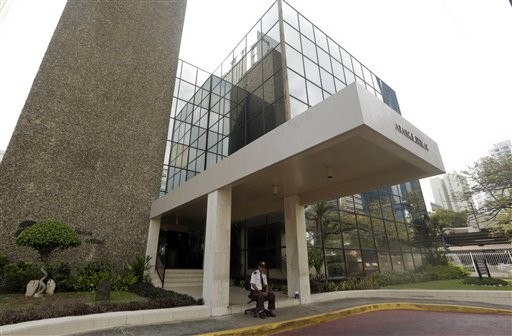Popular Reads
Top Results
Can't find what you're looking for?
View all search resultsPopular Reads
Top Results
Can't find what you're looking for?
View all search resultsGovt to use Panama Papers as supplementary tax data
Change text size
Gift Premium Articles
to Anyone
 A security guard sits outside the Mossack Fonseca law firm in Panama City on April 3. German daily Sueddeutsche Zeitung says it has obtained a vast trove of documents detailing the offshore financial dealings of the rich and famous. The International Consortium of Investigative Journalism says the latest trove includes nearly 40 years of data from the Panama-based law firm, Mossack Fonseca. The company did not immediately respond to a request for comment. (Associated Press/Arnulfo Franco)
A security guard sits outside the Mossack Fonseca law firm in Panama City on April 3. German daily Sueddeutsche Zeitung says it has obtained a vast trove of documents detailing the offshore financial dealings of the rich and famous. The International Consortium of Investigative Journalism says the latest trove includes nearly 40 years of data from the Panama-based law firm, Mossack Fonseca. The company did not immediately respond to a request for comment. (Associated Press/Arnulfo Franco)
L
eaked information on clients of Panama law firm Mossack Fonseca, known as the Panama Papers, will be used as supplementary data by the tax office, the finance minister says. Analyst have urged the government to use the data to pursue hidden tax potential.
Finance Minister Bambang Brodjonegoro said the government would examine information in the Panama Papers thoroughly and expected that the data would reveal a number of Indonesians who had undeclared assets in offshore companies.
Bambang said the government had information on Indonesians who had stashed money in countries that were tax havens. British Virgin Island, Cook Island and Singapore are the favorite tax havens for Indonesians.
“We will use the papers to supplement data that we currently have. According to our data, many Indonesians have ‘paper’ companies in various tax havens,” said Bambang in Jakarta on Tuesday.
He estimated that funds stashed overseas totaled more than Indonesia’s gross domestic product (GDP). “From estimated calculations of potential money owned offshore by Indonesians, I’d say it is more than our GDP, more than Rp 11.4 quadrillion [US$861.7 billion],” he said.
Bambang further said a planned tax amnesty would be effective in improving tax revenue, along with data that the tax office could use to target rich individuals. The amnesty will offer tax discounts to individuals and companies that declare their untaxed assets.
Center for Indonesia Taxation Analysis (CITA) executive director Yustinus Prastowo said the massive leak of more than 11.5 million documents on hidden assets in offshore companies coincided with the government’s effort to boost tax revenue through the planned tax amnesty.
“The Panama Papers momentum can be used as a trigger to push for the tax amnesty’s implementation. For the government, the challenge is to communicate better with the people. If there is no tax compliance, there will be decisive law enforcement,” he said.
In reports from the investigation by US-based International Consortium of Investigative Journalists (ICIJ) on Monday, nearly 215,000 companies and 14,153 clients were tied to Mossack Fonseca.
The reports reveal that politicians and businesspeople have been keeping their wealth in offshore companies for years. Even though the practice is generally legal, such financial arrangements can be misused for committing illegal practices, such as evading tax or money laundering. (vps/ags)









